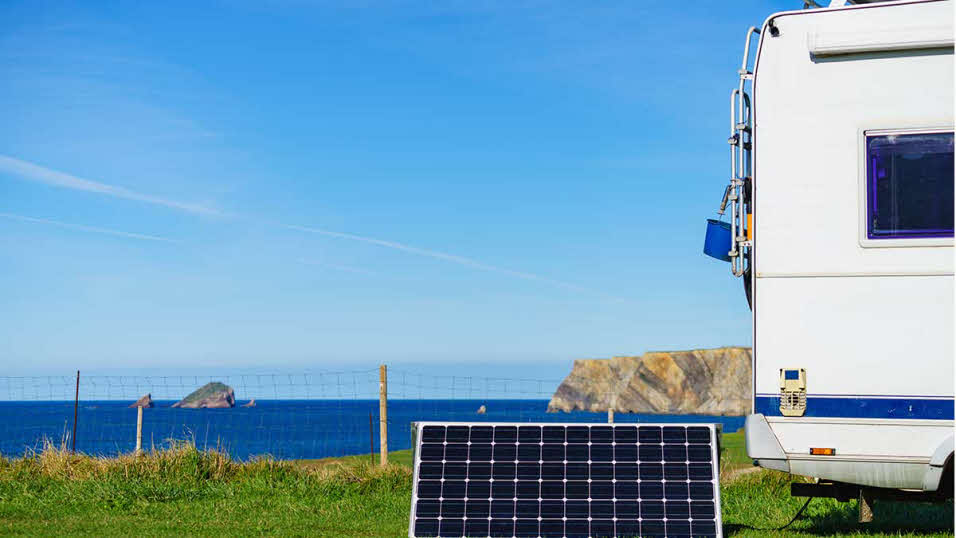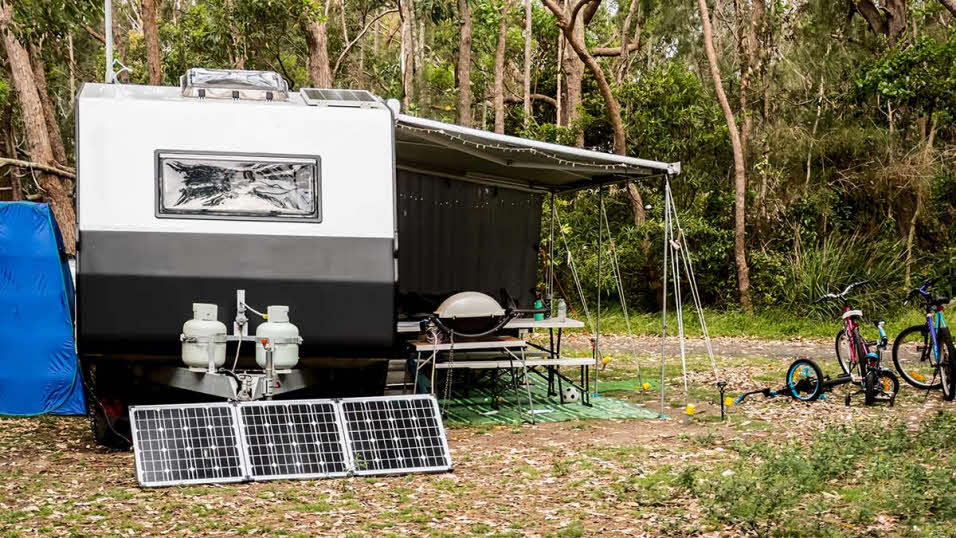Save 10% at Club Shop
Save up to 10% on everything from solar panels to awnings, chairs to puncture repair kits, we've got what you need.
Find out moreThe Club’s Technical Manager, Martin Spencer gives us his take on whether solar panels are right for you and your caravan.
There was a time not that long ago when very few leisure vehicles had solar panels - perhaps the occasional adventurous campervan. Now they seem to be almost the norm on new models, but are they right for you?
The first question to ask is, what do you expect a solar panel to do for you?
The reality is that the majority are a very long way off from being an effective alternative to the mains hook-up that we’ve all grown accustomed to on our Club campsites and elsewhere.

Here’s some options:
I just want to keep my leisure battery topped up while in storage.
Roof-mounted panels will generally do this, but do remember that during the winter, the sun is very low in the sky and the days are short. So therefore a horizontal panel will not generate anywhere near as much power as it will in the summer months.
Dirt, leaves, snow or of course a caravan cover will limit or prevent the panels from working. Some people use a portable panel instead, often one of the ‘briefcase’-style folding ones, as it can be angled to catch more sun. If you face your vehicle the right way, you might be able to position one inside one of the larger windows, although there will be a reduction in light due to the window tinting.
If you want to try one of the very small, very cheap solar panels (often just the size of a small book) which are often sold for this purpose, good luck. Their output is really low and they will rarely provide enough power. To maximise the chances of success, be prepared to experiment with its location, making sure it’s angled towards the midday sun. Always try to fully charge the battery before storage, to give the solar panel the best chance of keeping it topped up.
I want to be able to stay off-grid a little longer and not run out of 12V power.
The difference between 2-3 days off grid and 3-4 days can be really significant. A decent size solar panel (typically 100W or more) will certainly support a good battery. It probably won’t necessarily recharge it fully, but it will lengthen the time before it’s discharged.
It’s ideal for that long weekend on a basic Certificated Location campsite, a trip to a festival or a weekend rally. The effectiveness of the panel will always be season and weather dependent, though.

I want to stay off grid for longer.
For this, you really need to look at the whole power system, not just rely on the addition of a solar panel. It’s almost certain, that you’ll need:
These systems can get complex and quite expensive, so you really need to do a bit of homework before choosing exactly what will suit your individual needs.
There are good system suppliers and installers around who can make this easy, for a price. If not, the excellent Caravan & Motorhome Off-Grid Group on Facebook can provide a wealth of advice and guidance on what to buy and how to get the best from it.
All in all, solar power is great, as long as you appreciate its characteristics and limitations. Don’t compromise on the additional parts that you need to connect it up though, especially if you want to get the best performance. For instance, use quality connectors and cabling, and choose a good charge controller to connect the panel to your battery. These devices protect the battery from being overcharged on a really sunny day. However, if you want the optimum performance in our unpredictable weather conditions, choose the more sophisticated 'MPPT' kind instead of the cheaper 'PWM' ones, as they will maximise the efficiency of your panel.
If your solar panel(s) is not covered by your current policy, you might want to take a look at the Club's Caravan Cover. Under our cover, solar panels are included as part of your caravan equipment. All you have to do is make sure you have sufficient cover for all your equipment. If you are unsure, please do call us on 01342 649 880.
Last updated May 2024